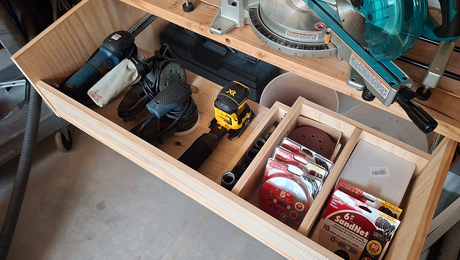Protecting your Tools from Humidity

So, you want a workshop along with a detached garage. Got some nice metal-working tools and wood-working tools. General construction is poured walls, flat (but sloped) roof, separate bays for 4 vehicles, earth covered on all but front. Central Illinois climate.
What effort would you expend to protect the tools from fluctuations in humidity and temp and dew point? Could insulate it like a tight house–could even ICF it–but that costs a lot. Could do just poured concrete and waterproofing, but that could lead to moisture and rust on tools.
What balance would you choose to limit condensation on tools?



















Replies
Are dehumidifiers a cost effective long-term solution?
Jon Blakemore
Dunno. Maybe.
Gotta balance that with the cost of insulation with the cost of heat with...???
...Central Illinois climate...
You don't ever have an easy one, do you? - concrete to boot... - OK, here's the deal - trouble is in the spring and to a lesser extent the fall - first warm day in March, humid air entering the structure precipitates out on any exposed concrete (and any tool) until the temperature of the mass exceeds the dew point - maybe 75-80 degrees on those days... - puddles will form, riverlets coursing down the wall, any wood in contact with the crete will saturate, stain and eventually rot - - vehicles will also sweat and rust -
- - if the structure is tight during these events, (which can last for several days), the moisture is limited to the humidity in the existing atmosphere in the structure, limiting condensation - but don't open the door...
insulate the surfaces so the mass of the crete doesn't present itself as a condensing surface -
conditioning the space is the most satisfactory solution...
The easy ones are the ones I never ask!
Normally I favor exterior insulation for concrete, of course. But with this one, I cannot see the wisdom in spending the money that would take for a 4 car garage plus workshop. Especially when the budget isn't exactly excessive. So, let's save money by not insulating the garage bays, but insulate the inside of the shop and heat that to some minimal level just to avoid the condition you describe. Put the money into the house.
Whatcha think? Reasonable plan?
And thanks.
I keep my tools in the back of the pickup with the duck decoys.
They get wet occasionally but the drive in at 80mph drys them off pretty good.
blueBe cautious when taking any advice from me. Although I have a lifetime of framing experience, some of it is viewed as boogerin and not consistent with views of those who prefer to overbuild everything...including their own egos!
DD has it right . Don't open the door in the spring . If you keep a constant temp (warm) the tool will not condense as much . Styrofoam table covers are a real help . If the surface does not interact with the moist air it will not rust. If you are conditioning the space then insulating the outside of the concrete would work .
...but insulate the inside of the shop and heat that to some minimal level just to avoid the condition you describe...
sounds like a great plan - especially if the 'minimal' heat system can be cranked up to work comfortably on cold winter days..."there's enough for everyone"
spray on lubes and protectants.
Like Boeshield B9 or Slip-it
I have an unheated shop that has tablesaw and molding machine in it, along with a planer and assortment of hand tools.
The tablesaw goes off to jobs occasionally. Jobs within spitting range of salt water. It doesn't even have the typical brown patina after a good ten years now.
Welcome to the
Taunton University of Knowledge FHB Campus at Breaktime.
where ...
Excellence is its own reward!